Sprouts Farmers Market Bundle
Who Really Owns Sprouts Farmers Market?
Understanding the Sprouts Farmers Market SWOT Analysis is crucial, but have you ever wondered about the forces steering this grocery giant? Unraveling the intricacies of Sprouts ownership reveals a fascinating narrative of growth, strategic shifts, and the influence of key players in the competitive natural foods market. From its humble beginnings to its current market position, the ownership structure has played a pivotal role.
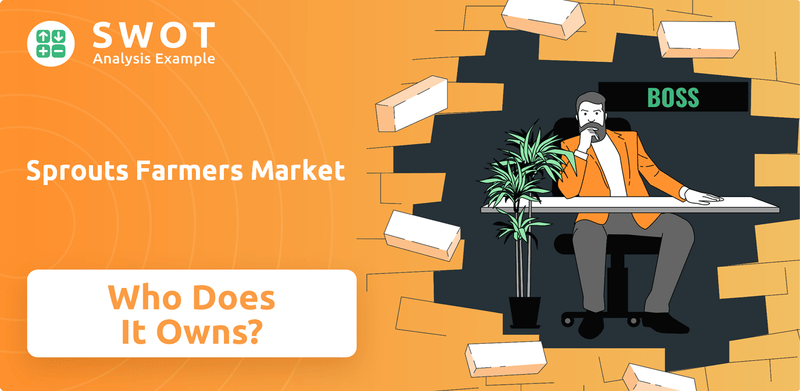
Delving into the details of Sprouts Farmers Market ownership provides critical insights for investors, strategists, and anyone interested in the company's future. Knowing who owns Sprouts, including the Sprouts parent company and major shareholders, is essential for evaluating its financial performance and understanding the motivations behind its strategic decisions. This exploration will uncover the evolution of Sprouts ownership, from its founders to its current publicly traded status, and highlight the impact of various investors and the Sprouts CEO on its trajectory.
Who Founded Sprouts Farmers Market?
The story of Sprouts Farmers Market began in 2002, thanks to the Boney family. Stan Boney, Shon Boney, and Kevin Easler, drawing on their experience in the natural food industry, were the driving force behind the company's launch. Their vision was to make healthy living accessible, and this idea shaped the early days of the business.
Initially, the ownership of Sprouts Farmers Market was largely a family affair. The founders held the main stakes in the company. While specific percentages from those early, private stages aren't public, it's clear their combined vision and resources were crucial. They set the stage for what Sprouts Farmers Market is today.
Early financial backing likely came from the founders' personal investments and possibly from angel investors or family friends who believed in their concept. These early agreements established the company's governance. This included plans for growth, potential future investments, and eventual expansion. The founding team's commitment to affordable healthy living was a key part of their operational model and was reflected in how they initially controlled the company, focusing on a unified strategy to achieve their market goals.
The early ownership structure of Sprouts Farmers Market was centered around the Boney family, who founded the company. The founders' vision and capital were fundamental to the company's start and early growth. The initial investors likely included the founders themselves, along with angel investors or family friends.
- The Boney family, including Stan Boney, Shon Boney, and Kevin Easler, were the founders.
- Early ownership was primarily within the founding family.
- Initial funding came from the founders and potentially angel investors.
- The focus was on making healthy living affordable.
Sprouts Farmers Market SWOT Analysis
- Complete SWOT Breakdown
- Fully Customizable
- Editable in Excel & Word
- Professional Formatting
- Investor-Ready Format
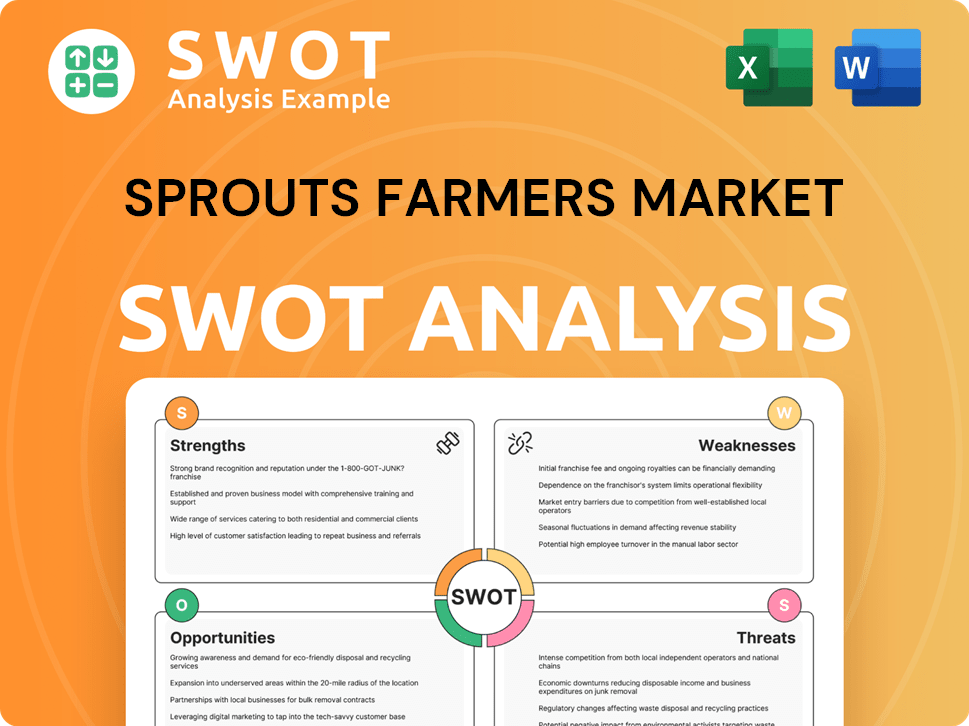
How Has Sprouts Farmers Market’s Ownership Changed Over Time?
The journey of Sprouts Farmers Market into the public domain marked a pivotal shift in its ownership structure. The initial public offering (IPO) on August 1, 2013, was a significant milestone, establishing the company as a key player in the natural foods market. This transition from private to public ownership broadened the investor base, introducing institutional investors and individual shareholders.
Following the IPO, the ownership landscape of Sprouts evolved, with shares distributed among various institutional investors, mutual funds, and individual shareholders. This diversification has influenced the company's strategic direction, particularly in areas such as financial performance, expansion strategies, and operational efficiency. The shift towards a more diverse shareholder base has also increased the focus on delivering shareholder value.
| Event | Date | Impact on Ownership |
|---|---|---|
| Initial Public Offering (IPO) | August 1, 2013 | Transitioned from private to public ownership, broadening the investor base. |
| Share Offerings | Ongoing | Dilution of initial ownership stakes, increased institutional investor presence. |
| Market Performance | Ongoing | Influences investor confidence and share value, impacting ownership dynamics. |
As of early 2025, major shareholders of Sprouts Farmers Market include prominent institutional investors. For example, The Vanguard Group holds approximately 11.2% of the shares, and BlackRock Inc. holds around 9.9%. These significant holdings by institutional investors reflect confidence in the company's long-term prospects. Understanding the Growth Strategy of Sprouts Farmers Market can provide further insights into the company's direction.
Sprouts Farmers Market's ownership has transformed significantly since its IPO in 2013. The company is now largely held by institutional investors, reflecting a shift in its financial and strategic focus.
- The Vanguard Group and BlackRock Inc. are among the largest shareholders.
- The IPO marked a transition to public ownership.
- Institutional investors now hold a significant portion of shares.
- The company's strategic direction is influenced by its diverse shareholder base.
Sprouts Farmers Market PESTLE Analysis
- Covers All 6 PESTLE Categories
- No Research Needed – Save Hours of Work
- Built by Experts, Trusted by Consultants
- Instant Download, Ready to Use
- 100% Editable, Fully Customizable
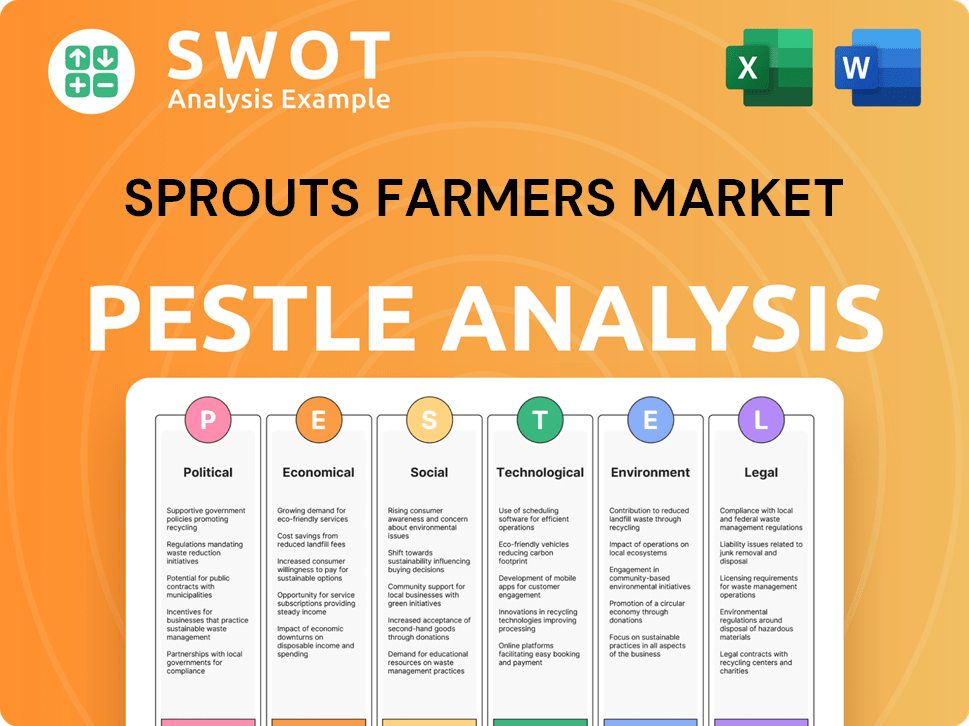
Who Sits on Sprouts Farmers Market’s Board?
The Board of Directors of Sprouts Farmers Market oversees the company's strategic direction and governance. As of early 2025, the board includes independent directors and individuals with operational and financial expertise. Nick Konat serves as President, CEO, and Director, while Jack Sinclair also holds a Director position. Joseph Fortunato is the Chairman of the Board. This structure aims to ensure robust oversight and balanced decision-making for the Sprouts company
.
The board's composition is vital for representing the interests of the diverse shareholder base. Institutional investors actively engage with the board through proxy voting and direct communication, ensuring accountability. The focus on independent directors helps in maintaining a balanced approach to decision-making, which is crucial for the Sprouts Farmers Market
corporate structure. This structure helps in navigating the competitive landscape.
| Board Member | Title | Key Role |
|---|---|---|
| Nick Konat | President, CEO, and Director | Leads the company's operations and strategic initiatives. |
| Jack Sinclair | Director | Provides oversight and guidance on company strategy. |
| Joseph Fortunato | Chairman of the Board | Oversees board activities and ensures effective governance. |
The voting structure at Sprouts Farmers Market follows a one-share-one-vote principle. This ensures that each share of common stock has equal voting power, which is standard for publicly traded companies. There are no known special voting rights that would give specific entities outsized control. The board's decisions are continuously monitored by its institutional investor base, which helps ensure accountability and alignment with shareholder interests. Understanding Sprouts ownership
is crucial for investors.
The Board of Directors at Sprouts Farmers Market is crucial for strategic oversight and governance.
- The board includes a mix of independent directors and those with operational expertise.
- The voting structure follows a one-share-one-vote principle.
- Institutional investors actively monitor the board's decisions.
- The leadership team, including the
Sprouts CEO
, plays a key role in the company's direction.
Sprouts Farmers Market Business Model Canvas
- Complete 9-Block Business Model Canvas
- Effortlessly Communicate Your Business Strategy
- Investor-Ready BMC Format
- 100% Editable and Customizable
- Clear and Structured Layout
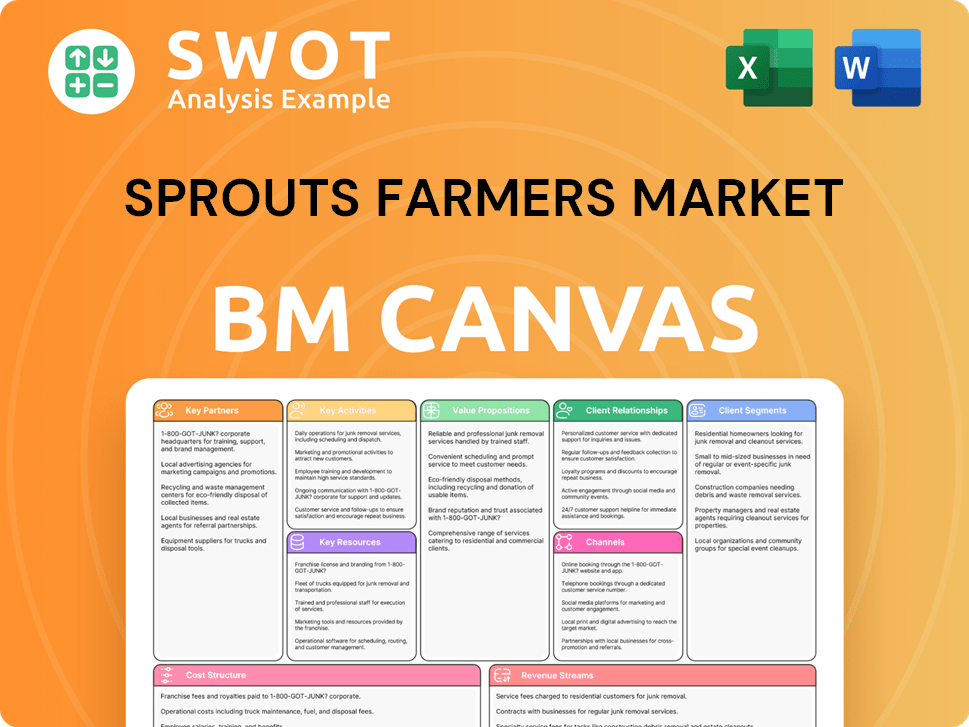
What Recent Changes Have Shaped Sprouts Farmers Market’s Ownership Landscape?
In the past few years, Sprouts Farmers Market has seen developments influencing its ownership. The company has continued its expansion, opening new stores and optimizing its supply chain. This strategic growth can impact its stock performance and investor interest. While specific share buybacks or offerings require detailed financial review, such activities are typical for public companies managing their capital structure.
Industry trends suggest increasing institutional ownership in the retail and grocery sectors, and Sprouts is no exception. Large asset managers continue to hold significant stakes. Founder dilution is common as companies grow and issue more shares, although the founding vision often remains central. The focus on health-conscious consumers has positioned Sprouts well in a growing market segment, attracting investors interested in sustainable and health-oriented businesses. Public statements and analyst coverage often highlight its growth strategy and financial performance, which can signal potential future ownership changes or strategic directions.
| Metric | Data | Source/Year |
|---|---|---|
| Market Capitalization (Approximate) | Around $3.5 billion | MarketWatch, May 2024 |
| Institutional Ownership (Approximate) | Over 80% | Yahoo Finance, May 2024 |
| Number of Stores (Approximate) | Over 400 | Sprouts Farmers Market Website, May 2024 |
The current ownership of Sprouts Farmers Market reflects a mix of institutional investors and potentially some insider holdings. The company's stock information, including major shareholders, is readily available through financial data providers. Understanding the Sprouts ownership structure is crucial for investors. The Sprouts company's performance and strategic decisions are key factors influencing its ownership profile. The Sprouts CEO and leadership team play a significant role in shaping the company's direction.
Institutional investors hold a significant portion of Sprouts' shares. Major shareholders are often large asset management firms. The exact percentage changes over time due to market activities.
Sprouts is a publicly traded company, with stock information available on major financial platforms. The stock's performance is influenced by various market factors. Investors can track the stock's price, volume, and other relevant data.
Ownership changes over time due to market dynamics and strategic decisions. Founder dilution is common as companies grow and issue more shares. The trend indicates increasing institutional ownership.
Sprouts focuses on health-conscious consumers, attracting specific investors. The company's growth strategy and financial performance are key. This positioning influences its ownership profile.
Sprouts Farmers Market Porter's Five Forces Analysis
- Covers All 5 Competitive Forces in Detail
- Structured for Consultants, Students, and Founders
- 100% Editable in Microsoft Word & Excel
- Instant Digital Download – Use Immediately
- Compatible with Mac & PC – Fully Unlocked
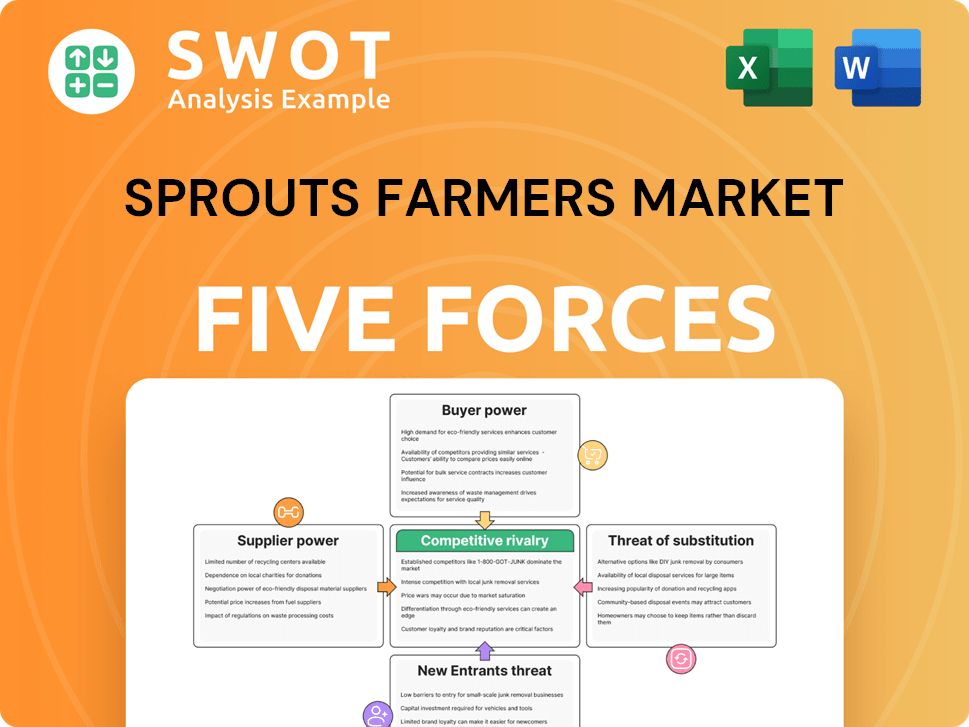
Related Blogs
- What are Mission Vision & Core Values of Sprouts Farmers Market Company?
- What is Competitive Landscape of Sprouts Farmers Market Company?
- What is Growth Strategy and Future Prospects of Sprouts Farmers Market Company?
- How Does Sprouts Farmers Market Company Work?
- What is Sales and Marketing Strategy of Sprouts Farmers Market Company?
- What is Brief History of Sprouts Farmers Market Company?
- What is Customer Demographics and Target Market of Sprouts Farmers Market Company?
Disclaimer
All information, articles, and product details provided on this website are for general informational and educational purposes only. We do not claim any ownership over, nor do we intend to infringe upon, any trademarks, copyrights, logos, brand names, or other intellectual property mentioned or depicted on this site. Such intellectual property remains the property of its respective owners, and any references here are made solely for identification or informational purposes, without implying any affiliation, endorsement, or partnership.
We make no representations or warranties, express or implied, regarding the accuracy, completeness, or suitability of any content or products presented. Nothing on this website should be construed as legal, tax, investment, financial, medical, or other professional advice. In addition, no part of this site—including articles or product references—constitutes a solicitation, recommendation, endorsement, advertisement, or offer to buy or sell any securities, franchises, or other financial instruments, particularly in jurisdictions where such activity would be unlawful.
All content is of a general nature and may not address the specific circumstances of any individual or entity. It is not a substitute for professional advice or services. Any actions you take based on the information provided here are strictly at your own risk. You accept full responsibility for any decisions or outcomes arising from your use of this website and agree to release us from any liability in connection with your use of, or reliance upon, the content or products found herein.